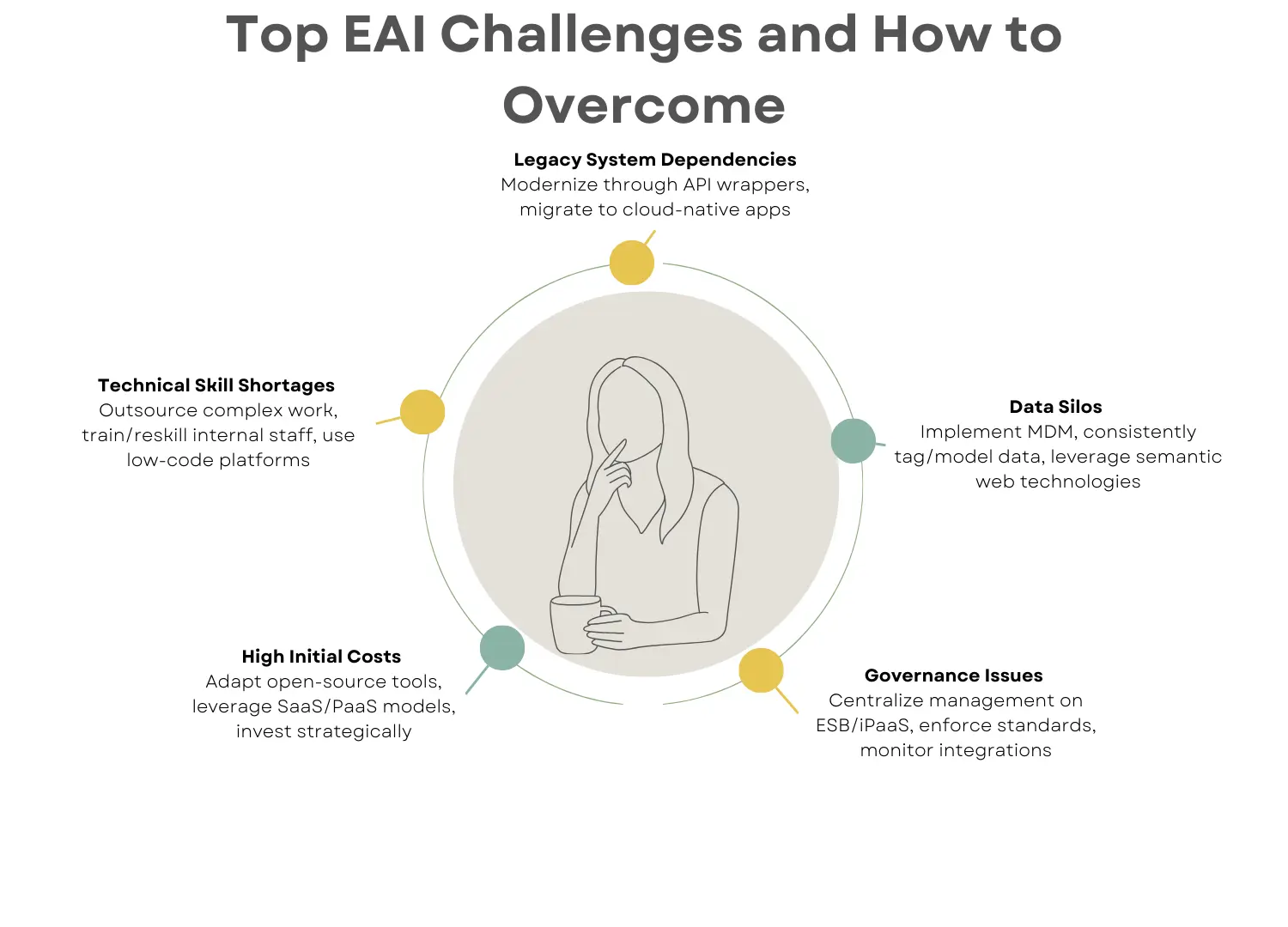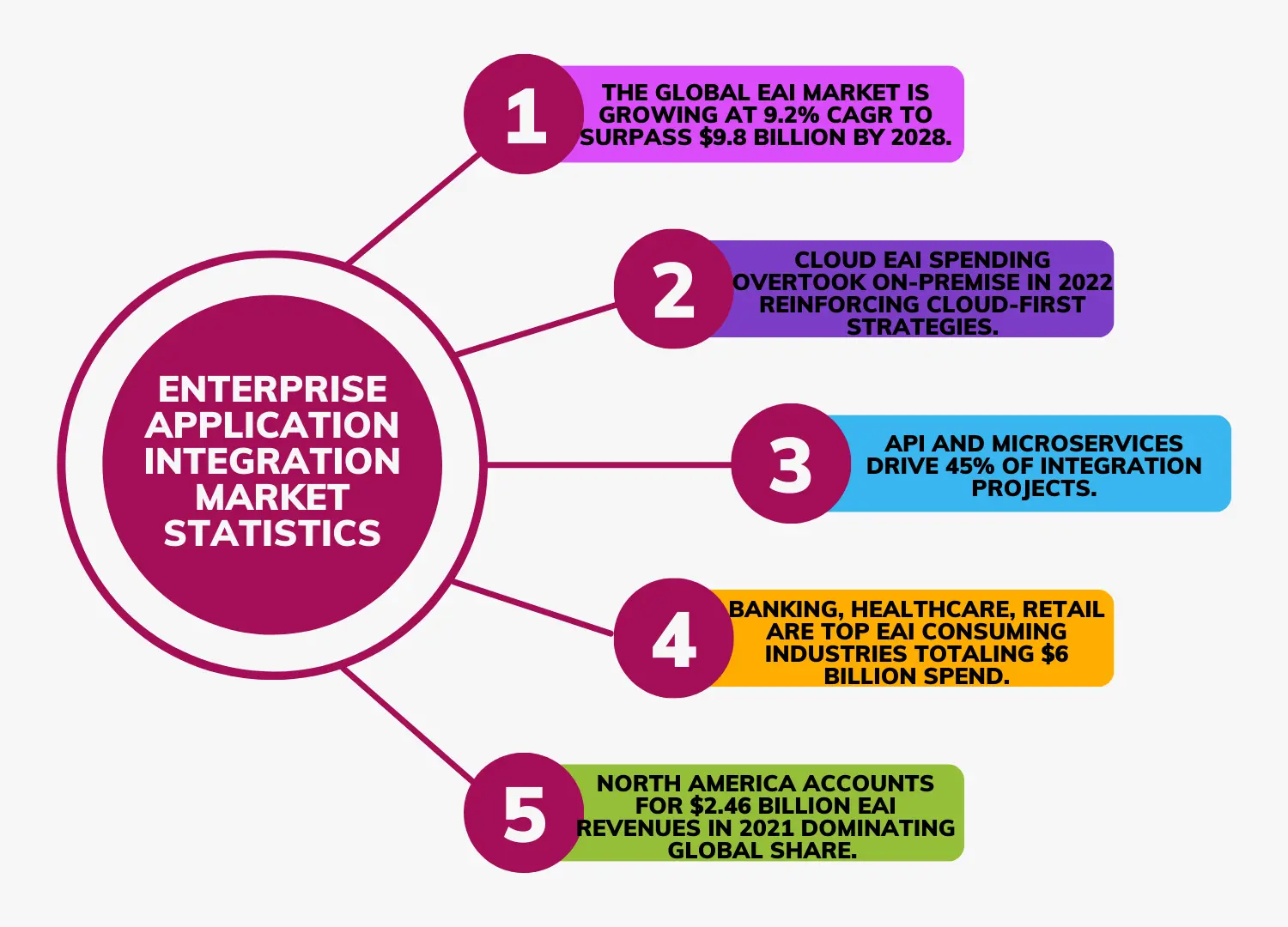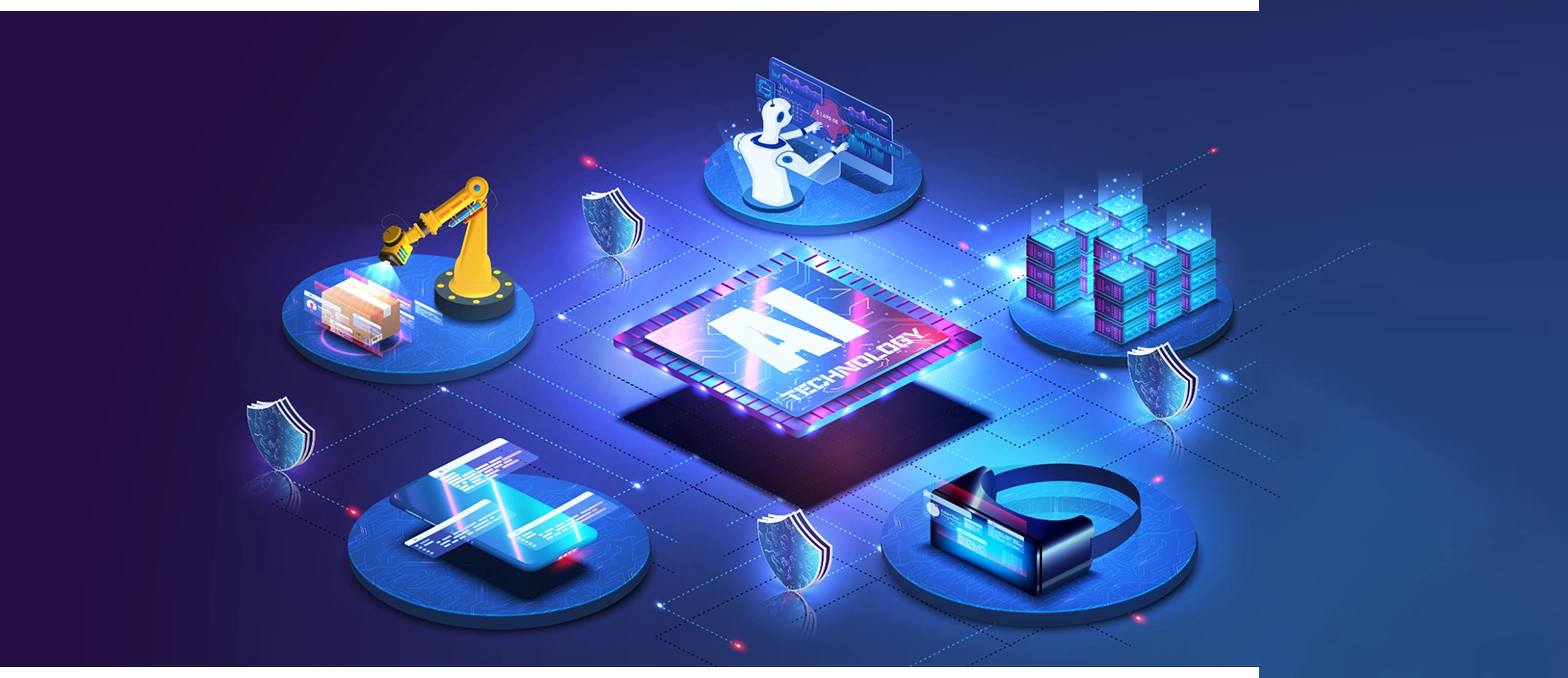Table of Contents
By constantly switching between different independent systems, businesses are at the risk of creating a damaged application environment, which also increases the possibility of duplication of data and functionality. By integrating applications together, businesses can ensure transparency in their operational processes as well as explore the hidden potential of their existing IT systems. And, the best way to do that is by teaming up with enterprise application integration services experts.
Enterprise applications are the lifeblood powering business operations 24/7. However, these discrete systems often function in silos until integrated properly. This is where Enterprise Application Integration (EAI) comes in by fostering interoperability across disparate apps.
This article discusses key aspects of EAI – the types or approaches, wide-ranging benefits it provides, and common challenges faced during implementation. It aims to serve as a comprehensive guide for unlocking real business value through optimal EAI strategies. We will explore the benefits and need for application integration in your business as per the top iOS app development companies. And also share the challenges you might face in this process.
So, let’s dig deep and discuss everything in detail.
What is Enterprise Application Integration (EAI)?
The solution to the issue of interaction between enterprise apps can be found in enterprise-wide application integration (EAI) which is the application of tools that allow the communication between enterprise applications. Enterprise application integration software is an intermediate framework that allows data flow between different applications, without making major modifications to the database configurations or the application itself that result in a smoother process and greater availability of data.
Why Should You Implement EAI?
When an organization expands to its size, enterprise application integration best practices will adopt more and more applications for enterprises that help in the management of front-office as well as back-office tasks. Companies rely on accounting software and tools for managing customer relationships analytics platforms, as well as other applications to deliver crucial features and services for business however there is an issue with the traditional application deployment process for enterprise applications: silos of information.

Communication between enterprise apps is not automated which means that the tools aren’t configured to talk to one another or transfer information back and forth or share business rules or communicate with each other in any manner. This causes a wide range of inefficiencies for businesses as suggested by the top mobile app development companies in USA:
- If vital data is gathered in one application, it has to be manually entered into different applications.
- If crucial data is altered within a particular application, those changes are not visible in other applications. the modifications must be made manually.
- If an application requires data that is not available in another application, the user will have to manually search for the information.
Inefficiencies can cause poor availability of information and delays in administrative processes and slowing down business processes.
As per custom mobile app development services In USA, enterprise applications are installed on-premises at the company’s private data center. They could also be installed in the cloud’s private servers, which are hosted on-site or managed by a third-party service company. Certain enterprises have moved their applications to cloud-based public environments. Others have constructed and modified an hybrid cloud structure in which some apps are stored on cloud servers that have private access and others are hosted on public cloud servers and there’s a common interface between the two.
Types of Software
As an enterprise implements different types of software, the impact and the existence of information silos inside the company could increase exponentially. Some of the most commonly used applications used by enterprises as per the best mobile app development companies in California include:
- Accounting systems
- Automated billing systems
- Business Analytics and Intelligence Platform
- Planning for business continuity (BCP)
- Content management system
- CRM tools for Customer Relationship Management (CRM) tools
- Email marketing platform
- Enterprise resource planning (ERP)
- Enterprise messaging systems
- Payment processing
- Service desk application
Information silos that are caused by an ever-growing array of business critical applications that are internally accessible are the primary reason enterprises are taking part in integrated enterprise apps. To put it in perspective there are three key factors that drive the use of enterprise-wide application integration as per the cross platform app development services experts:
Integrating Data
Enterprises that use a variety of externally and internally-facing applications require the integration of information from multiple applications, and ensure that databases are synchronized, as well as streamlining access to data and availability across the whole company.
Vendor Independence
Enterprise application integration can reduce an organization’s dependence on specific vendor software by abstracting the business policies or regulations from the software and turning it into an intermediate framework. Instead of modifying an application using business rules rather, an organization customizes its enterprise integration system using guidelines and business rules that make it easier to replace enterprise applications and select new vendors if needed.
Interfacing with Common
Enterprise application integration system provides an opportunity to create common interfaces or common facades which can connect to various applications. Instead of having to learn twenty different user interfaces for twenty apps, EAI might allow employees of an organization to master one GUI (GUI) which is connected seamlessly to existing databases, applications, and other tools for enterprise. This can streamline administration processes and allows employees to improve their productivity when with enterprise software.
Enterprise Application Integration: Market Trends And Stats
The modern digital enterprise relies on a dynamic ecosystem of applications working together to power essential business processes. As technology footprints expand rapidly, the need for strategically integrating disparate enterprise applications into cohesive workflows has never been greater. The enterprise application integration platform market addresses this pressing business imperative through platforms, services and solutions enabling interoperability across diverse software landscapes. Here we analyze the latest trends and market statistics influencing the EAI sector.

Growing Market Size
The global EAI market valued at $5.2 billion in 2021 is projected to reach $9.8 billion by 2028 according to Technavio, exhibiting growth of 9.2% CAGR. Key factors fueling expansion include proliferating enterprise applications, demand for real-time business insights, and the digital transformation priority of seamless inter-system communication. Allied Market Research pegs the worldwide EAI market size at $10.59 billion by 2030, up from $6.15 billion in 2021. Increased spending on integration middleware, cloud EAI, and API management will accelerate market growth.
Platforms vs Services
Standalone platforms offering integration capabilities remain a significant market segment. However, the flexible, cloud-based enterprise application integration services model is gaining traction rapidly. Grand View Research calculates the global EAI services portion will rise from 37% market share in 2021 to over 40% by 2030. Key players like Dell Boomi, Informatica, and MuleSoft offer EAI in the cloud as consumption-based, scalable services. This lowers upfront investments while addressing dynamic integration demands cost-effectively.
Cloud Integration Ascending
With businesses embracing cloud-first strategies, cloud-based EAI is garnering unprecedented popularity. Research And Markets sizes the cloud EAI segment at a formidable $3.1 billion in 2022, seeing 28.2% CAGR to reach $10.03 billion by 2030. API integration, cloud integration platforms as a service (iPaaS), microservices, open source adoption, and serverless computing are next-level cloud EAI trends taking off. Synergy Research found cloud EAI spending overtook on-premise costs for the first time in 2022, underlining the sector’s strategic “cloud-first” inflection point.
Industry-wise Adoption Trends
Unsurprisingly, verticals at the forefront of digital acceleration lead EAI consumption globally. For instance, banking and financial services accounted for over 20% market share in 2021 due to proliferating fintech solutions. Healthcare providers are also turning to EAI vehemently to streamline critical care workflows amid a technology surge. Retail and e-commerce, manufacturing, telecom, and energy and utilities round up the biggest adopter industries that collectively spend over $6 billion yearly on EAI software, services and tools according to Markets and Markets. Customized, regulatory compliant integration solutions tailored for different verticals will gain strength.
Regional Market Statistics
North America claimed the lion’s share of the global EAI market in 2021 at $2.46 billion, and is estimated to rise at 8.1% CAGR to $3.91 billion by 2026. Asia Pacific is emerging as a strategic investment hotbed for EAI players, with China, Japan and India driving regional market valuation of $1.64 billion in 2021 according to Statista. Europe, Middle East and Africa also represent sizable markets where demand especially from Germany, UK, and UAE is expected to catapult integration spending. Latin America is projected as the fastest growing region with a promising 10-year CAGR of over 11%.
Top Vendors Performance
U.S.-based companies dominate the competitive EAI vendor landscape thanks to pioneering research and consistent product innovation to improve app performance. IBM was the dominant player with over $750 million in 2021 EAI revenues across hybrid cloud and AI-powered integration portfolios according to GlobalData. Other frontrunners include Oracle, SAP, Microsoft and Informatica with specialized capabilities in app modernization, master data management, API management and B2B integration respectively. Newer category-defining companies like Boomi, Mulesoft, and SnapLogic are challenging incumbent market share through cloud-native strategies targeting SMB needs effectively. Acquisitions and partnerships will also shape future EAI vendor ecosystems.
Why is Enterprise Application Integration Important?
As we know, multiple applications or software are used in an enterprise for day-to-day operations. A single organization uses different enterprise software or apps for different functions like inventory, sales and marketing, and more. Such modularization of tasks or functionalities allows the decision-makers or leaders to designate responsibilities to specific personnel that would otherwise consume a lot of their time.
This allows senior executives to focus on organization growth and development as per the top enterprise mobile app development experts. But, such categorization of tasks creates interoperability, data integration, and security issues. Such siloed structures mean important information often gets stuck at departmental levels, obstructing business growth and development.
To overcome such challenges, EAI enterprise application integration is a must for your business. By availing EAI services, you can ensure a seamless exchange of vital information across your organization.
EAI ensures better connectivity and communication b/w enterprise applications. And, helps you overcome the challenges associated.
Types of Application Integration
Below are the different aspects of application integrations as per the top enterprise app development company. Take a look:
Shared Database Integration
A shared database allows different enterprise applications to access and modify common data through centralized storage. While this was once a popular approach, it faces several challenges long-term. All applications becoming dependent on a single database introduces a major point of failure. Database changes can also break compatibility with different technologies like CRM systems not designed for such integration. Security considerations for mobile app integration is difficult to manage at scale with all applications having the same database permissions. Overall, shared databases are best for simple integration needs, but do not provide the scalability required of modern enterprise application integration tools.
Service-Oriented Architecture
Exposing applications as independent, interoperable services is now the standard for enterprise applications integration (EAI). Individual services focus on well-defined business functions and communicate through standardized interfaces like REST or SOAP. This service-oriented architecture (SOA) allows point-to-point integration between specific application pairs. However, orchestrating communication between many services becomes complex. A centralized integration layer like an enterprise service bus (ESB) collects services and facilitates routing, mediation, discovery and management at scale. ESBs provide reusable and standardized integration processes. As enterprise applications expand, an ESB based SOA remains one of the most robust and scalable platforms for long-term mobile app integration projects.
Robotic Process Automation
Rather than traditional programming, robotic process automation (RPA) utilizes software robots or ‘bots’ to capture and configure common business processes and tasks. Bots emulate human user interface interactions like clicking buttons or entering data to replicate processes across different systems. RPA can rapidly automate high volumes of repeatable activities and is well-suited for integration between legacy or unstable applications. However, bots depend on exact interface replication and may require adjustment during application changes. While powerful for standardized workflows, RPA lacks the dynamism of richer programmatic integration. It works best complementing, not replacing, other EAI approaches.
Other Types
Database Integration
Perhaps the earliest type, this involves connecting different applications to a shared database. All read and write to common tables, but it creates issues like single point of failure and security risks at scale.
API/Service Integration
Exposing applications as independent, reusable services is now standard practice. An Enterprise Service Bus (ESB) or Integration Platform as a Service (iPaaS) acts as the coordination layer facilitating modular integration.
Process Integration
Rather than code, tools like Business Process Management (BPM) and Robotic Process Automation (RPA) capture workflows visually for replay across systems. This streamlines repetitive tasks but depends on interface stability.
Data Integration
Extract, Transform and Load (ETL) utilities or Elastic Stack-based ELK technologies help pull data from diverse sources, cleanse and model it for consolidated storage and analytics.
Hybrid Models
Combining the above based on specific landscape and growth plans offers balanced integration addressing use cases better, leveraging synergies. Customized blends are carefully designed in consultations.
So, selecting the right integration method requires considering an organization’s long-term technical landscape and growth plans. A combination of strategies from Android app development companies often provides the balance of speed, scalability, agility and governance needed to effectively unite enterprise applications.
Benefits of Enterprise Application Integration Services
As per the custom mobile application development company experts, below are the benefits you get with EAI services.
Workflow Automation
You can integrate multiple applications to automate your business processes, thereby reducing labor costs and the time required for strategic maintenance tasks. For instance, with enterprise application integration solutions in place, a marketing firm can fetch data from CRM software to run an email campaign easily.
Improved Organization Communication and Data Sharing
By availing EAI services, you can improve interoperability and communication b/w different organizational departments. For example, the siloed operations in the automotive industry cost them billions of dollars every year. An agile enterprise application software solution can solve its challenges significantly by eradicating siloed processes and operations.
Improvement in Customer Service Levels
With better IT integration capabilities, enterprise software systems can connect more seamlessly to exchange vital custom information. This helps service teams fulfill customer needs and deliver a timely resolution.
Higher Operational Efficiency
By availing EAI services from an experienced enterprise software development company, you can eliminate communication gaps, optimize critical processes, and impart better control in your organization. EAI allows you to realize holistic benefits against your investment in IT infrastructure. Managing disruptions or breakdowns across departmental processes becomes much easier. For instance, a logistics firm can ensure better coordination b/w its inventory, accounting, and transportation software with proper application integration infrastructure in place.
New Business Opportunities
Proper EAI also lets you identify and respond to new business opportunities during volatile market conditions. You can anticipate, analyze, and predict the impact of external market conditions on your industry and shift your business strategy accordingly to stay risk-averse and operational amid uncertainty.
Take the example of the elearning solutions industry, the businesses with proper EAI in place have built integrated online learning systems to stay operational amid COVID-19 uncertainty. They are using EAI services to streamline processes and create connected systems that seamlessly exchange information across their enterprise IT systems.
Cost Optimization
The implementation of EAI technologies can also help you minimize costs associated with the maintenance of IT infrastructure in your firm. When you have old and new systems interconnected, you don’t need to make additional investments. Also, the seamless integration of existing business applications cut down the cost related to the new system or outsource app development. Thus, EAI ensures cost saving across the product lifecycle.
Overcoming EAI Challenges
Some remedies to challenges include garnering top management buy-in, outsourcing integration complexities to specialist mobile application consulting services, adopting hybrid cloud-premise models for flexibility and lower costs, re-skilling workforce, modular launches in phases, centralized API/data governance.
Overall, a prudent EAI strategy combining multiple techniques tailored to capabilities, needs and desired outcomes helps organizations derive unmatched benefits from their application ecosystems. With meticulous planning and execution, the transformative power of integration can be unlocked sustainably.
Building A Better Strategy for Enterprise Application Integration
The number of apps or systems you need to connect in your business is increasing every passing day. It’s important to choose enterprise application integration services and API solutions – that are reliable, secure, and efficient.
A3Logics being an experienced enterprise software solution provider understand this need precisely. We serve business across industries with next-gen EAI solutions designed to support your business needs.
If you want to hire mobile app developers to connect your enterprise systems faster and eliminate data silos, drop us a line today. Our custom mobile app development services experts will assist you in rapidly integrating your critical enterprise systems.
FAQs
Q1. What are the different types of enterprise application integration (EAI)?
The main types include database integration, API/service integration using ESBs or iPaaS, process/workflow integration using BPM or RPA tools, file/data integration through ETL/ELT processes. Hybrid models combining multiple approaches are also common.
Q2. What are the key benefits of EAI?
EAI streamlines interoperability, enhances productivity, enables real-time insights, improves customer experience, reduces costs through centralized governance and reuse. It fosters agility to support changing business needs through its modular nature.
Q3. What challenges are commonly faced in EAI?
Challenges include high initial costs, complex custom coding needs, technology dependencies, skill shortages, legacy modernization difficulties, governance over dispersed systems and data silos. Adopting microservices and cloud-native tools helps alleviate many challenges.
Q4. What factors should be considered for EAI selection?
Consider integration needs and scope, existing IT landscape, growth plans, technical abilities, costs, vendor stability, and long term sustainability. A phased approach using a combination of tools typically works best.
Q5. What is the future of EAI?
EAI will leverage disruptive technologies like AI, IoT, blockchain app development for richer insights. Cloud-native, API-first and event-driven integrations will gain prominence. Self-healing integrations, decentralization and blockchain adoption will also shape the future.







